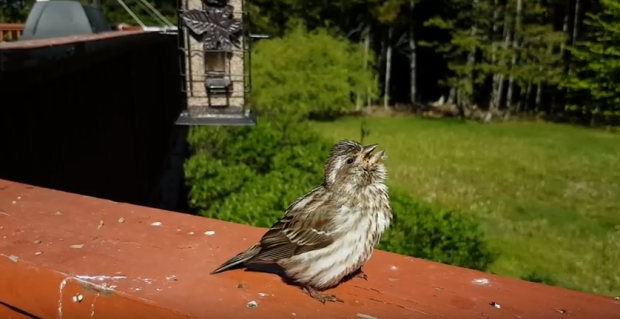Be on the lookout for infectious bird disease, says wildlife pathologist
With warmer weather coming, wildlife officials are asking people to be on the lookout for a disease in songbirds that include purple finches and goldfinches.
Trichomonosis is typically fatal for birds. It spreads in the warmer months and prevents birds from swallowing food or water.
It was fist documented in Atlantic Canada in 2007.
"It causes a severe inflammatory reaction in the back of the mouth," said Dr. Laura Bourque, a wildlife pathologist at the Atlantic Veterinary College in P.E.I.
Symptoms include fluffed-up feathers and depressed, lethargic behaviour. "They may have wet feathers surrounding the beak area," she said.
Diseased birds may also have pieces of debris or seeds around their mouth, Bourque said.
"What happens is they try to swallow and they can't, so they regurgitate."
Bird feeders part of the problem
Bird feeders are a large contributor to the spread of the disease because infected birds mingle with healthy ones, she said.
"If you feed birds, and if you're able to you, should regularly clean your feeders and keep an eye on the birds. And if your birds are healthy carry on with that very you know, sort of hygienic practice of cleaning your feeders."

However, if anyone sees any indication that there may be disease present, they should take down their feeders right away, and report birds they have seen with symptoms to local wildlife officials Bourque said.
"The best solution is to … promote a bird-friendly environment in their backyard."
That could include planting shrubs and flowers and trees that birds like to be around, Bourque said.
"They can still attract birds to their backyard, but they don't have this problem of having birds congregating at a single site contaminating each other feed and spreading disease that way."
Bourque said last year there weren't many confirmed cases of the disease on the Island, but people did report seeing some sick birds at their feeders.
More P.E.I. news

